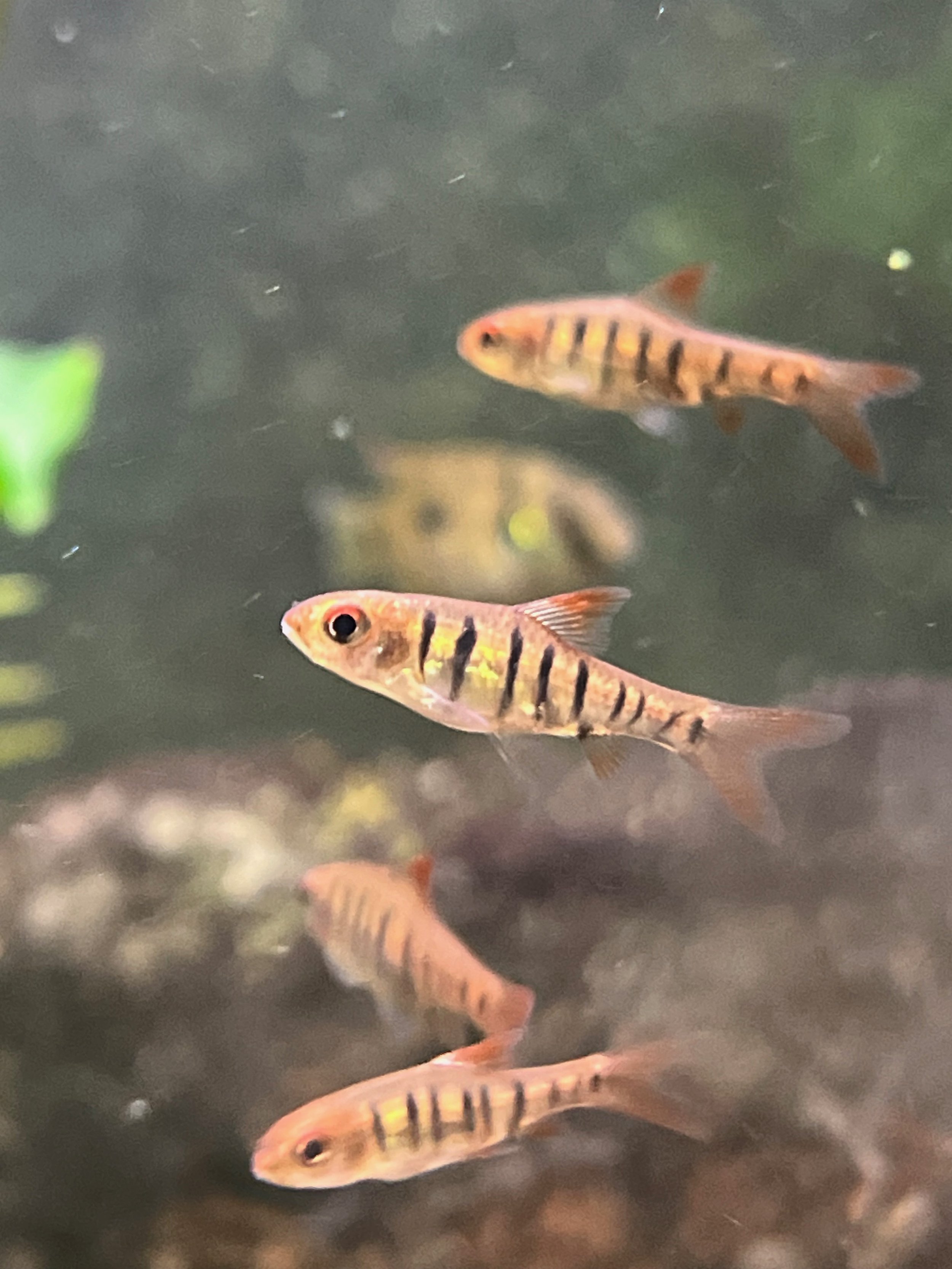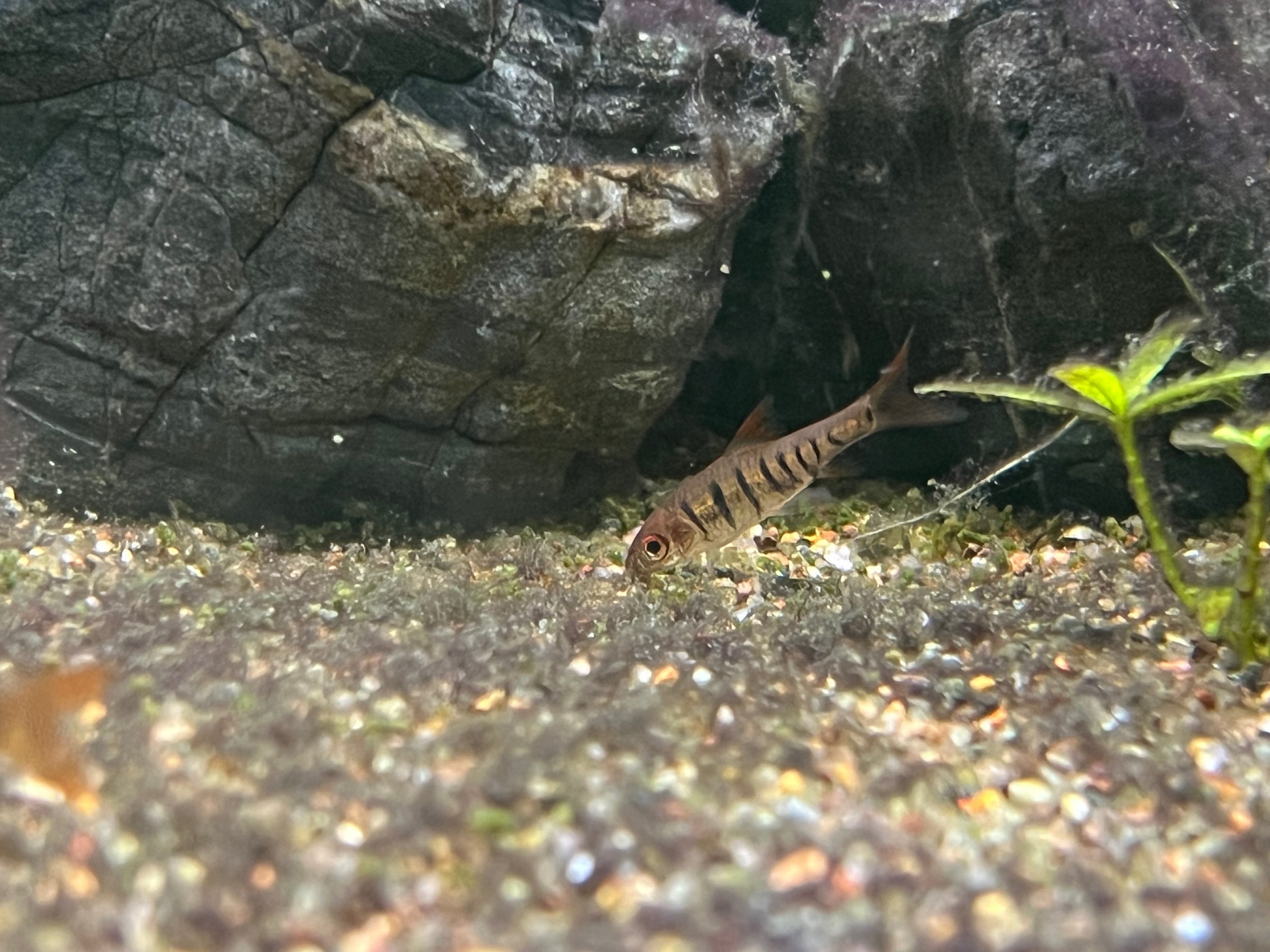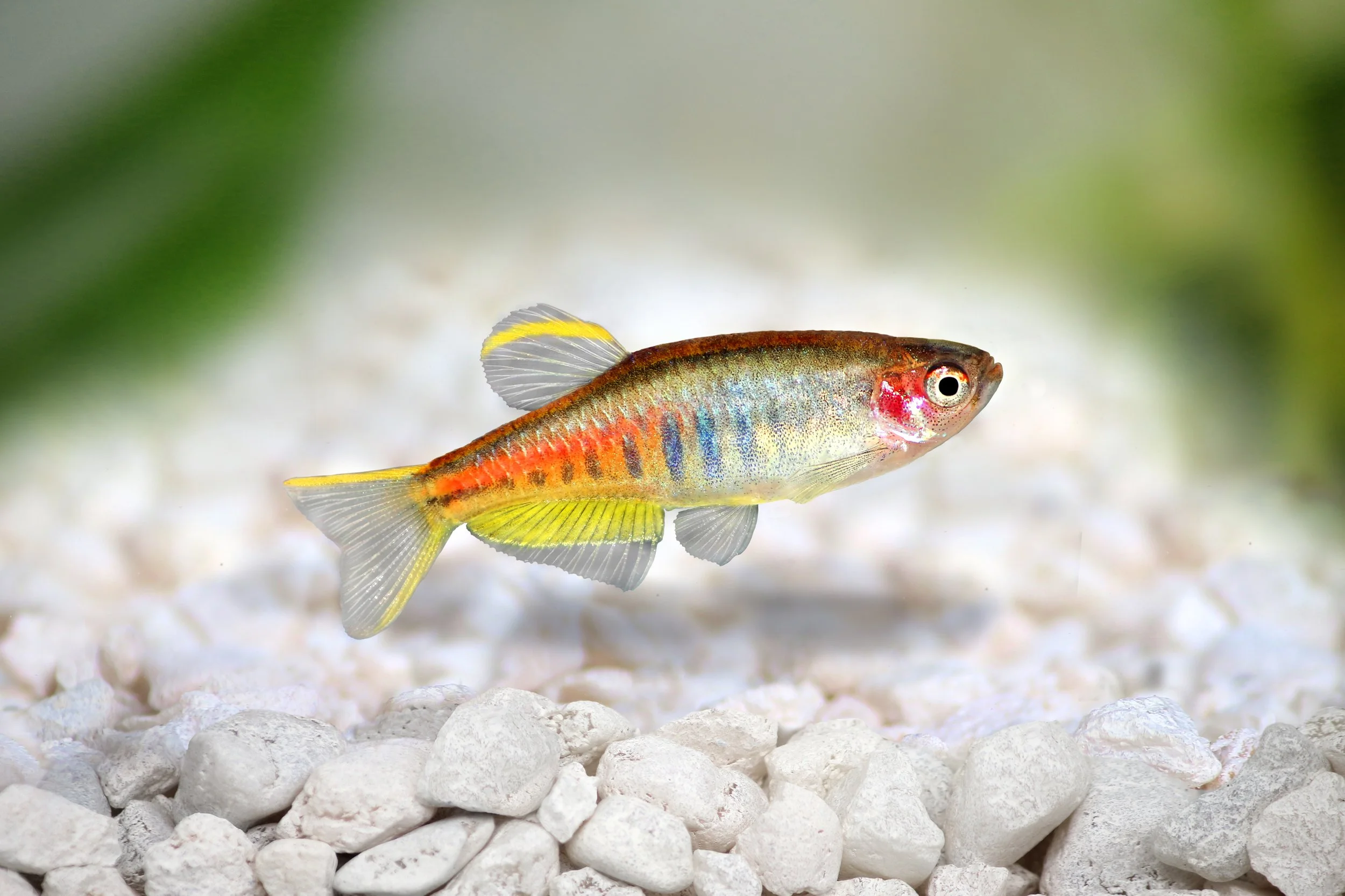 Image 1 of 3
Image 1 of 3

 Image 2 of 3
Image 2 of 3

 Image 3 of 3
Image 3 of 3




African Banded Barb
The African Banded Barb (Barbus fasciolatus) is an intriguing freshwater fish species native to the pristine waters of the Okavango Delta in Sub-Saharan Africa. Known for its striking appearance, lively demeanor, and captivating behaviors, the African Banded Barb is a prized addition to freshwater aquariums.
Physically, the African Banded Barb showcases a sleek and elongated body adorned with a vibrant gold coloration. Vertical bands in deep black extend from the fish's head to its tail, creating a striking contrast against its golden body. Additionally, the species displays a streamlined profile and a forked tail fin, adding to its visual appeal. Mature individuals typically reach lengths of around 2 to 2.4 inches (5 to 6 centimeters).
In aquariums, African Banded Barbs are known for their active and sociable nature, making them excellent additions to community setups. They thrive in groups and feel most comfortable when kept in the company of their own kind. Additionally, they coexist peacefully with a wide variety of tank mates, including other peaceful fish species that share similar water parameter requirements.
Water parameters for African Banded Barbs should closely resemble their natural habitat conditions to ensure their health and well-being. They prefer warm water temperatures ranging from 75 to 82°F (24 to 28°C) and slightly acidic to neutral pH levels between 6.5 to 7.5. Providing ample swimming space, as well as natural hiding spots and vegetation, helps replicate their native environment and promotes natural behavior.
When it comes to diet, African Banded Barbs are omnivorous and will readily accept a varied diet. A combination of high-quality flake or pellet food, supplemented with live or frozen foods such as bloodworms, brine shrimp, and daphnia, helps maintain their vibrant coloration and overall health. Additionally, offering vegetable matter in the form of blanched spinach or algae-based foods contributes to their nutritional needs.
Breeding African Banded Barbs in captivity is possible with the right conditions and setup. A separate breeding tank with subdued lighting, fine-leaved plants, and spawning mops can stimulate spawning behavior. Once spawning occurs, the adults should be removed to prevent them from consuming the eggs. The fry can be raised on a diet of infusoria and finely powdered commercial fry foods until they are large enough to consume standard fish fare.
Overall, the African Banded Barb is a captivating and dynamic addition to freshwater aquariums, prized for its stunning appearance, active behavior, and peaceful disposition. Whether kept in a species-specific setup or a community tank, these charismatic fish bring beauty, vitality, and excitement to any aquatic environment, making them a popular choice among aquarists of all experience levels.
The African Banded Barb (Barbus fasciolatus) is an intriguing freshwater fish species native to the pristine waters of the Okavango Delta in Sub-Saharan Africa. Known for its striking appearance, lively demeanor, and captivating behaviors, the African Banded Barb is a prized addition to freshwater aquariums.
Physically, the African Banded Barb showcases a sleek and elongated body adorned with a vibrant gold coloration. Vertical bands in deep black extend from the fish's head to its tail, creating a striking contrast against its golden body. Additionally, the species displays a streamlined profile and a forked tail fin, adding to its visual appeal. Mature individuals typically reach lengths of around 2 to 2.4 inches (5 to 6 centimeters).
In aquariums, African Banded Barbs are known for their active and sociable nature, making them excellent additions to community setups. They thrive in groups and feel most comfortable when kept in the company of their own kind. Additionally, they coexist peacefully with a wide variety of tank mates, including other peaceful fish species that share similar water parameter requirements.
Water parameters for African Banded Barbs should closely resemble their natural habitat conditions to ensure their health and well-being. They prefer warm water temperatures ranging from 75 to 82°F (24 to 28°C) and slightly acidic to neutral pH levels between 6.5 to 7.5. Providing ample swimming space, as well as natural hiding spots and vegetation, helps replicate their native environment and promotes natural behavior.
When it comes to diet, African Banded Barbs are omnivorous and will readily accept a varied diet. A combination of high-quality flake or pellet food, supplemented with live or frozen foods such as bloodworms, brine shrimp, and daphnia, helps maintain their vibrant coloration and overall health. Additionally, offering vegetable matter in the form of blanched spinach or algae-based foods contributes to their nutritional needs.
Breeding African Banded Barbs in captivity is possible with the right conditions and setup. A separate breeding tank with subdued lighting, fine-leaved plants, and spawning mops can stimulate spawning behavior. Once spawning occurs, the adults should be removed to prevent them from consuming the eggs. The fry can be raised on a diet of infusoria and finely powdered commercial fry foods until they are large enough to consume standard fish fare.
Overall, the African Banded Barb is a captivating and dynamic addition to freshwater aquariums, prized for its stunning appearance, active behavior, and peaceful disposition. Whether kept in a species-specific setup or a community tank, these charismatic fish bring beauty, vitality, and excitement to any aquatic environment, making them a popular choice among aquarists of all experience levels.
The African Banded Barb (Barbus fasciolatus) is an intriguing freshwater fish species native to the pristine waters of the Okavango Delta in Sub-Saharan Africa. Known for its striking appearance, lively demeanor, and captivating behaviors, the African Banded Barb is a prized addition to freshwater aquariums.
Physically, the African Banded Barb showcases a sleek and elongated body adorned with a vibrant gold coloration. Vertical bands in deep black extend from the fish's head to its tail, creating a striking contrast against its golden body. Additionally, the species displays a streamlined profile and a forked tail fin, adding to its visual appeal. Mature individuals typically reach lengths of around 2 to 2.4 inches (5 to 6 centimeters).
In aquariums, African Banded Barbs are known for their active and sociable nature, making them excellent additions to community setups. They thrive in groups and feel most comfortable when kept in the company of their own kind. Additionally, they coexist peacefully with a wide variety of tank mates, including other peaceful fish species that share similar water parameter requirements.
Water parameters for African Banded Barbs should closely resemble their natural habitat conditions to ensure their health and well-being. They prefer warm water temperatures ranging from 75 to 82°F (24 to 28°C) and slightly acidic to neutral pH levels between 6.5 to 7.5. Providing ample swimming space, as well as natural hiding spots and vegetation, helps replicate their native environment and promotes natural behavior.
When it comes to diet, African Banded Barbs are omnivorous and will readily accept a varied diet. A combination of high-quality flake or pellet food, supplemented with live or frozen foods such as bloodworms, brine shrimp, and daphnia, helps maintain their vibrant coloration and overall health. Additionally, offering vegetable matter in the form of blanched spinach or algae-based foods contributes to their nutritional needs.
Breeding African Banded Barbs in captivity is possible with the right conditions and setup. A separate breeding tank with subdued lighting, fine-leaved plants, and spawning mops can stimulate spawning behavior. Once spawning occurs, the adults should be removed to prevent them from consuming the eggs. The fry can be raised on a diet of infusoria and finely powdered commercial fry foods until they are large enough to consume standard fish fare.
Overall, the African Banded Barb is a captivating and dynamic addition to freshwater aquariums, prized for its stunning appearance, active behavior, and peaceful disposition. Whether kept in a species-specific setup or a community tank, these charismatic fish bring beauty, vitality, and excitement to any aquatic environment, making them a popular choice among aquarists of all experience levels.






